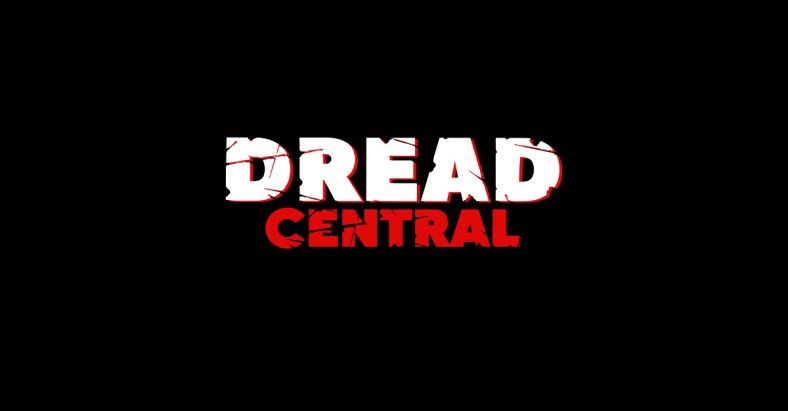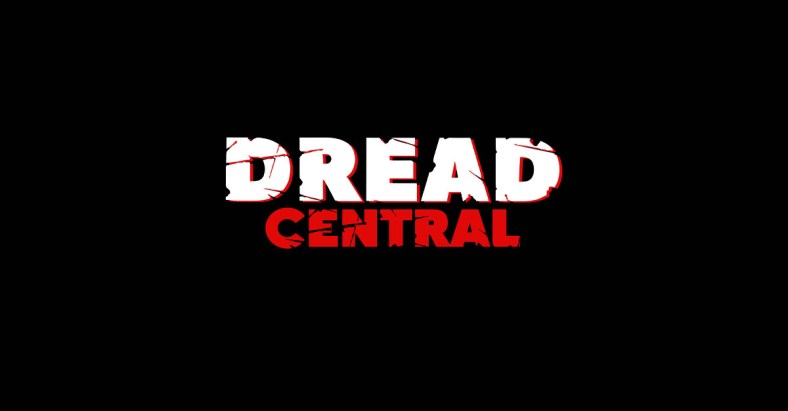Interview with BRAID’s Mitzi Peirone, Dream Weaver

First-time feature film writer/director Mitzi Peirone is such a deep thinker, that when Dread Central sits down with the Italian-born filmmaker in NYC for an allotted 20-minute interview, she spends nearly 10 minutes answering just the first question alone! Whereas other interviewees deliver rote, canned answers, Peirone practically provides a college thesis when responding. Yes, this filmmaker takes her job very seriously!
If you’ve seen Peirone’s debut effort Braid, which arrived in theaters and On Demand February 1 from Blue Fox Entertainment following its 2018 Tribeca Film Festival launch, you can understand why. A real mind puzzle of a psychological thriller, Braid follows Petulia and Tilda (Imogen Waterhouse and Sarah Hay), two ladies on the lam who scheme to rob the sprawling Grey Gardens-like estate of childhood pal Daphne (Cam’s Madeline Brewer). The disturbed Daphne welcomes her old chums to her home and convinces them to replay the bizarre games they indulged in during their youth. But these games aren’t child’s play anymore, and things soon go in a surreal and violent direction… Peirone picks up the rest of the story.

Dread Central: Braid is so many things. How would you describe it?
Mitzi Peirone: The movie is a psychological thriller, a horror flick with tons of gore and psychedelics, with twists and turns, and it starts off as a home heist movie. But it’s truly a philosophical essay. It came from a place of existential thinking. It came from a place of wondering what reality really is, how much of it is shaped by our thoughts and what we are truly. What separates us from our dreams, what separates people who didn’t make it and those who do make it into their dream life? Because in the end, we’re all the same. How is that some things do pan out for people and not for others?
And I started thinking about kids playing make believe. Why do we have this unwritten Bible in our head that tells us we have to play make believe as kids, to sort of rehearse life? There is no adult or parent who goes up to their children and tells them to play house now so that they can prepare for life. No, we just do this instinctual thing. Then, somehow, we stop playing make believe to become adults. But what if we’re the dream of a dream? What if we are in the shadows of our own dreams? What if we’re part of a simulation? What if we’re part of a hallucination?
Imagination utilizes this double-edged sword that can create so much, but it can also keep you stuck in constant procrastination, paranoia, delusions. Many of my fears are completely made up in my head, but I think about them so much that I project them into reality. I was thinking about these girls as tragic heroes. My heroes are flawed and they want something that they can’t get. And then the inciting incident happens, the drug bust, and they go into this underworld and through all kinds of trials and tribulations and have to face their demons. So, with the house and this world of make believe, the girls know the rules of this world and they know the rules of pain. It’s familiar, it’s safe. Sometimes it sucks because they get punished for whenever they try to escape, but at least they’re safe. They’re OK in this world. It’s the outside that’s terrifying.
DC: Would this film have been possible if you didn’t write it after you personally hit rock bottom?
MP: God bless hitting rock bottom. I highly recommend it [Laughs].. Braid definitely did come from a turbulent, difficult place. At 19, I jumped off into the unknown and moved to New York from Italy without knowing anybody. I barely spoke English, and I went to theater school because I felt like I needed to get down to the deep core of human behavior, of human desire. Understanding why we do things we do and what makes us who we are. Later, I was acting and modeling for a time. I booked this one acting job and worked [behind the scenes] for a year and a half on this movie, [helped raise] money for it, until the director hit on me and then fired me. I had put all my eggs in one basket. I didn’t have a lawyer, I didn’t have a manager, no agent, contract, nothing. As an actor, I was shattered emotionally. After embodying a character and then seeing that taken away from me was close to a miscarriage. It is truly a devastating experience. On top of that, the modeling agency lost my visa; I was stuck in New York City at 23, unemployed, without a way to go back. Because if I had gone back home to Italy, I wouldn’t have been able to return to the states.
Braid saved my life because I had to keep myself going somehow, and I had all these thoughts about what went wrong, how did I do this? [While] writing it, the deeper I was going into this whole matrix of make believe and reality and fantasy, I was like, “Oh, Plato’s Cave, The Matrix, I’m Pirandello and as Shakespeare says, ‘All the world’s a stage, And all the men and women merely players.’” We’ve been echoing this idea of reality not being real for thousands and thousands of years. Plus, the movie plays a lot with the idea of time not even being real; technically, time, we made it up too.
DC: Describe the writing process.
MP: So, I ended up in a room by myself, like a psychopath or a serial killer, with pictures, quotes and a bunch of lines drawn everywhere. And I was suffering with the characters. I was fighting the battles of the characters, like Petula and her need to be validated by reality. She’s an actress and a model and she’s constantly facing the uncertainty, financial and existential, of her jobs. And I was questioning reality with the movie as the movie was questioning itself. And the more the movie was evolving and growing, I started getting financing for it. I realized, “The beast is growing, this is happening.” I basically tricked myself into believing that I could do this and now I’m doing it. It works. I dreamed myself into existence. This is crazy. I’m a director. How did this happen?
DC: For a first-time feature director, Braid is amazingly accomplished. What do you owe that to?
MP: I had a phenomenal team. Every single person that joined this mind trip journey was in the perfect place of, “I have enough experience, but I want to do something that’s never been done before. And I want creative freedom.” Every single one of my actors and department heads told me the same thing: “I have never been so challenged and so let free in my entire life.” It was scary and beautiful to make this movie for everybody. The right people responded to it, and it acted as a social filter. A cosmic magical collision of everything that I’ve ever cared about in my life, from graphic novels to philosophy to art to music to Greek tragedy, collided into filmmaking. So, people read the script, saw the vision and said, “I guess this girl has it somehow.”
DC: Were the lead actress roles difficult to cast?
MP: Yes, in a way. The script is very complicated, so complex and specific. It required very specific minds to be attracted to it. It required people who were extremely imaginative and very courageous at the same time. They had to be emotionally smart, good at free associating or just thinking beyond the walls [to a place] that can seem a bit philosophical, a bit psychedelic, a bit into the dark side. The girls were exceptional. I couldn’t have asked for anybody better.
DC: In writing the script, did you have the ending down first and work your way backward?
MP: A little bit. From being a student of Greek tragedy and whatnot, I knew that I needed the beginning and the ending first, and then I had to figure out the middle part. So, I knew I knew the ending. That’s always the best writing advice: start from the bottom.
DC: With Braid, are you saying that too much playtime can be a bad thing?
MP: It’s a cautionary tale in the end. It says: “Honor your dreams but don’t die in those dreams.”
DC: Some reviews have compared Braid to Dario Argento’s films. Were they an influence?
MP: Not really, though I’ve watched Deep Red a million times. What influenced the movie the most was A Clockwork Orange. As far as the baroque, over-the-top, self-indulgent, toxic youth that has no idea of the weight of their actions. At age 15, I watched Donnie Darko, Requiem for a Dream and The Dreamers by Bertolucci, and those three did really have a huge impact on me.
DC: Like Argento, you make your key murder scene beautiful.
MP: I wanted the most horrific things to look so poetic and so beautiful because of that psychological mechanism that we have of justifying our demons. I wanted it to look like a dance, like opera. I wasn’t specifically inspired by Argento, though.
DC: Some of the photography is dizzying.
MP: Director of photography Todd Banhazl and I clicked immediately. The second that I sat down with him, he said, “I’m going to shoot your movie like Caravaggio on LSD!” I thought, “This person knows about art history and he knows about psychedelics. Perfect.” We called our style “offensively baroque.” We had a bunch of different looks for the movie. The outside needed to be gritty, ugly and dirty, with Dutch angles and a Won Kar Wai look. Inside the house, we wanted it to be perfectly composed, cinematic, grander than life. like a Renaissance painting. We also decided that whenever reality was too jarring to understand, we would flip the camera upside down. We wanted to create the idea of reality being this puzzle that was collapsing, so just making reality so unreliable that you got lost just as much as the girls got lost.
DC: You experienced a kind of postpartum depression after wrapping the film. Why did it affect you so much?
MP: Because I worked on it for three years. I gave it all that I had. I left my family, left the comfort of my home, quit modeling, I had to sacrifice all these things so that I could just focus on Braid. It really demanded my full attention that I was more than happy to give it to, because it’s been the greatest joy of my life. Making this movie also helped me find my purpose, the meaning of my existence and just why I’m on this earth right now. It was an extremely fulfilling, transcendental experience to find something that I can offer to the world and that I’m good at.
Those five weeks shooting were the best weeks of my life. I’d never been that happy ever. And it was chaos and it was emotional and crazy, yet it was the greatest joy of my life. And once it was done, I didn’t know what to feel or what to think about because everything within my whole soul and body and brain and heart went into the making of this movie. So, I felt like a ghost walking around an empty house in my mind. What did I used to care about? Now that it’s done, what do I do?
DC: What’s next for you?
MP: I already have two other feature films that I am currently developing. One is a horror/psychological thriller. The other one is a bigger picture, [set in] a dystopian desert, more apocalyptic, action-driven, intense. Aldous Huxley’s Brave New World meets Mad Max.
Categorized:News

